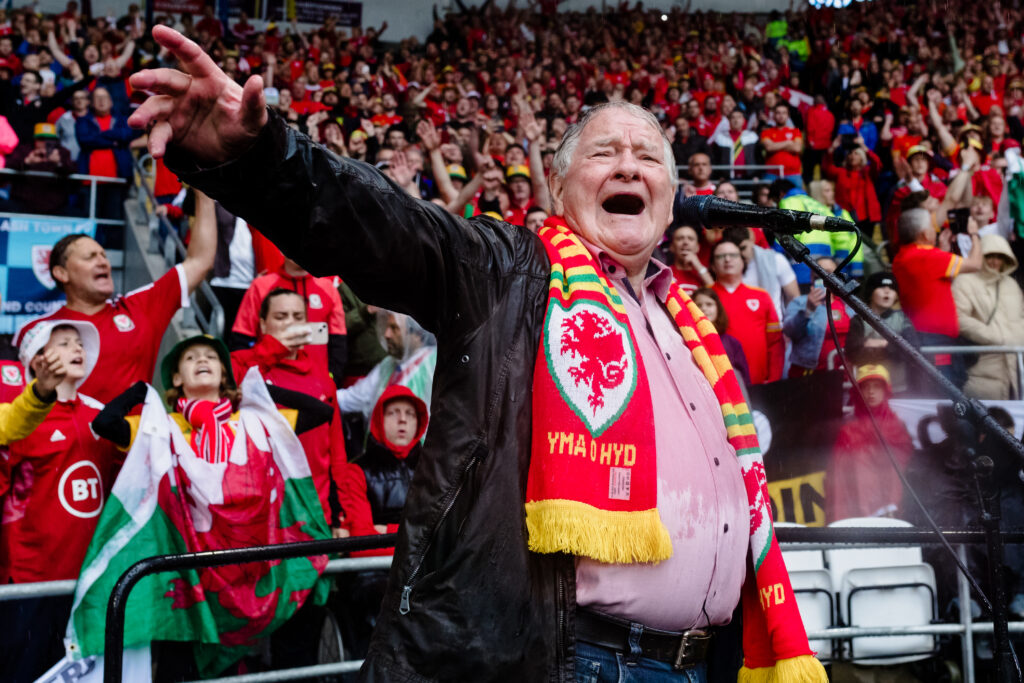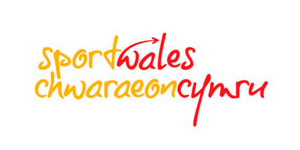WSA Sports Industry Awards 2023 Winner Feature: FAW Yma o Hyd and the World Cup
In 2022, Wales qualified for the FIFA World Cup for the first time in 64 years. Alongside the football fever in Cymru arose a global awareness of the Welsh language courtesy of the Football Association’s (FAW) work with Dafydd Iwan’s Yma o Hyd – work that went on to win Best Commitment to the Welsh Language at the Welsh Sports Association (WSA) Sports Industry Awards 2023.
The FAW invited Dafydd Iwan to sing Yma o Hyd, a song composed 40 years earlier in 1982, at Cymru’s World Cup Play-Off matches.
The song subsequently gained worldwide recognition before and during the World Cup and reached number one on the iTunes chart in June 2022. The song and moments such as Ben Davies’ Welsh language-only press conference ahead of the Iran game at the FIFA World Cup created huge awareness of the language throughout the world.
“The whole of Wales wanted to contribute and support the squad,” FAW Head of Public Relations Ian Gwyn Hughes told the WSA, “but I think it’s fair to say that Yma o Hyd did more than anything to promote the Welsh language and Wales away from the football on a global scale.
“A simple idea to generate the passion and feeling in the stadium ahead of the play-off games developed into something and a reaction that no one really could have foreseen. The impact inside the stadium was immediate and obvious, and the reaction generally in the country was powerful from people of all ages and from Welsh speakers and non-Welsh speakers alike.”
With one of the main themes of the song being the tale of the underdog, it’s easy to understand why this folkloric tune captured the imagination.
“There is little doubt that the song itself stirs passion and emotion,” Ian continued, “and that appealed outside of Wales. ‘What was this 40 -year-old song performed by an individual who was approaching his 80th birthday?’
“A few days following qualification Dafydd met the players at the team hotel,” Ian revealed. “The respect they showed towards him was huge and they recognised the part he had played in their success.
“And I don’t think we can underestimate the power of Gareth Bale in all of this. A global superstar, I am sure that many all over the world were fascinated by Gareth, Wales and his association with the song.
“If you remember during the celebrations after the Ukraine game, Dafydd Iwan came back onto the pitch to sing the song with the squad and went over to Gareth who was with one of his children. An image like that is powerful!”
The instant adoption as Yma o Hyd as a secondary anthem encapsulated the FAW’s ambition to connect with Wales and Welsh communities. The impact was there for all to see.
“I have been around Welsh football a long time and witnessed periods of near misses as well as virtually being out of the running after three games,” Ian explained. “I always believed in the potential but felt we needed to create that feeling of unity between the national teams and the Welsh public.
“That is why one of the first things we did was explain the importance of the anthem, take the players to Ypres and Aberfan to gain a sense of history and understanding about Wales and its communities. And part of that identity was the Welsh language, whether a Welsh speaker or not the language was always respected.”

Not only did the connection between the national football teams and the public grow to unexpected levels, but Wales had also made a mark on a global scale. So much so that opposing fans joined Welsh supporters to sing Yma o Hyd at the World Cup in Qatar.
For the FAW’s work in promoting the Welsh language globally, the organisation was the recipient of the Best Commitment to the Welsh Language award at last year’s WSA Sports Industry Awards.
“To receive the award was humbling,” stated Ian, “as was getting that recognition from other sports.
“It was also an opportunity to see the fantastic work other sporting bodies with far fewer resources are doing. We have been lucky, of course, having been given the platform on a worldwide scale due to the success of the teams, the profile of the players, and of course France 2016.”
It’s safe to say that the Welsh language has now become synonymous with football in Wales having become a unifying factor, and the road to Qatar certainly drove that.
“In terms of the legacy,” Ian went on, “I’d like to think that the atmosphere and the culture at the Cardiff City Stadium during and in the build-up to matches shows what is possible. That bilingualism is just the norm. Rhydian, the match announcer, for example, works bilingually with Welsh often used first.”
And the Welsh bilingualism shines through when the national anthem begins, of course.
“The anthem is incredible,” Ian said. “I remember a time when the anthem was barely heard at Welsh international matches. Now, it is sung with pride and passion. The same can be said for Yma o Hyd and Calon Lan.
Concluding, Ian commented on how the language can often “be used as a political football. In terms of the work at the FAW, it is about identity, about our history and culture, and language is part of that.
“We tell the players that they represent a young, modern, confident Wales where we can achieve great things and not be told Wales can’t do this due to our size.
“In terms of the Welsh language, I’d like the legacy to be, whether people speak Welsh or not, they respect it and accept if for what it is.”
And don’t forget to shout about the event using #WSASIA2024 on socials!



















